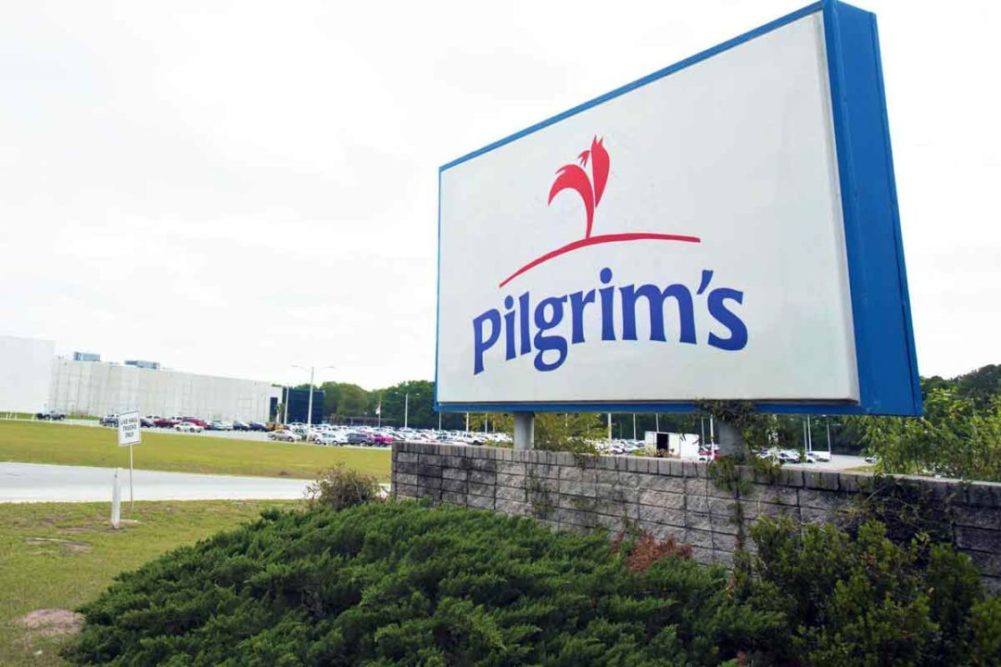GREELEY, COLO. – Pilgrim’s Pride Corp. reported an uptick in poultry sales to Mexico and increased domestic demand, but headwinds weighed on financial results during the third quarter of fiscal 2020.
The company said net sales for the third quarter ended Sept. 30, 2020, increased to $3.08 billion, from $2.78 billion reported in the comparable year-ago quarter.
Net income attributed to Pilgrim’s was $33.4 million, or 14¢ per diluted share, compared with $109.8 million, or 44¢ per diluted share, reported in the third quarter of 2019. Excluding a $110.5 million fine paid as part of an agreement the US Department of Justice, adjusted net income for the third quarter was $161.7 million, or adjusted earnings per share of 66¢.
The company attributed the result to higher costs and expenses in addition to the DOJ fine. Pilgrim’s entered a plea agreement with the DOJ over charges the company engaged in a price fixing scheme. The company agreed to pay the fine, and the Antitrust Division of the DOJ agreed not to bring further charges related to the case.
Selling, general and administrative expenses (SG&A) jumped to $219.6 million from $94 million in the third quarter of 2019.
Fabio Sandri, chief executive officer of Pilgrim’s, said that conditions are improving, poultry markets have remained volatile and challenging as a result of the pandemic (COVID-19). He credited the company’s diversified strategy for mitigating the negative impacts of the current business environment and producing “…the expected results in relative performance to industry competition and deliver more resilient performance regardless of changes in specific market conditions.”
“During the third quarter, in the US we are continuing to see demand recovering at our fresh operations, including from some sectors within foodservice, with more states gradually loosening travel and movement restrictions,” Sandri said. “Our Retail and QSR businesses have been especially strong, and demand from our customers has been outperforming the industry. Commodity large bird deboning was once again the most challenged this quarter.
“Operationally however, we continue to improve our relative performance versus the industry across all our business units, including commodity segments,” he continued. “We also continue to adapt quickly to changes in channel demand by adjusting the mix of our production capabilities, supported by our close partnerships with Key Customers, strong focus in execution by our team members, the geographical diversity of our footprint, and our presence across all bird size categories.”
The company’s business in Mexico recorded one of the strongest third quarters in Pilgrim’s history despite unfavorable mix impact and added operating costs. Net sales in the Mexico segment were $335.2 million compared with $328.8 million reported in the third quarter of 2019.
Operating income jumped to $61.7 million from $37.7 million in the year-ago quarter.
Sandri said several factors contributed to the result, including higher economic activities, better supply/demand balance, a stronger peso and increased share of non-commodity products.
“After a very difficult first half in 2020, our Mexican operations delivered great results in Q3, and we generated one of the strongest Q3s in the company’s history in Mexico despite the unfavorable mix impact and added operating costs relative to the same period last year,” Sandri said. “A normalization in economic activities, an improved supply/demand balance in the market, a stronger peso, and a very good operational performance, all contributed to the strength. We are continuing to invest in our Del Dia and premium Pilgrim’s brands (both prepared and fresh), as well as seeking more market share in the modern channel, which will bring more stable margins to our operations.”
Other bright spots for Pilgrim’s were Moy Park, its legacy European chicken business, and momentum of its newly acquired European pork assets in Tulip Ltd.
The European segment reported net sales of $845.7 million in the third quarter compared with $517.5 million reported in the year-ago period.
Operating income was $29.9 million, up from $25.3 million reported in 2019.
“Our legacy European chicken operations are continuing to improve, driven by exposure to retail as well as a recovery in foodservice demand, particularly from QSR, despite the significant impact of COVID-19 on the operations,” Sandri said. “In addition, our strong internal operating performance and commitment to innovation have helped in mitigating the difficult environment. The positive momentum in improvement from the newly acquired European pork assets has been maintained, with positive EBITDA and margins continuing to increase.
“The performance was driven by strong demand at retail partially offset by a reduction in foodservice, continuing strength in pork exports especially to China, as well as the implementations of operational improvements and synergy capture,” he said.


